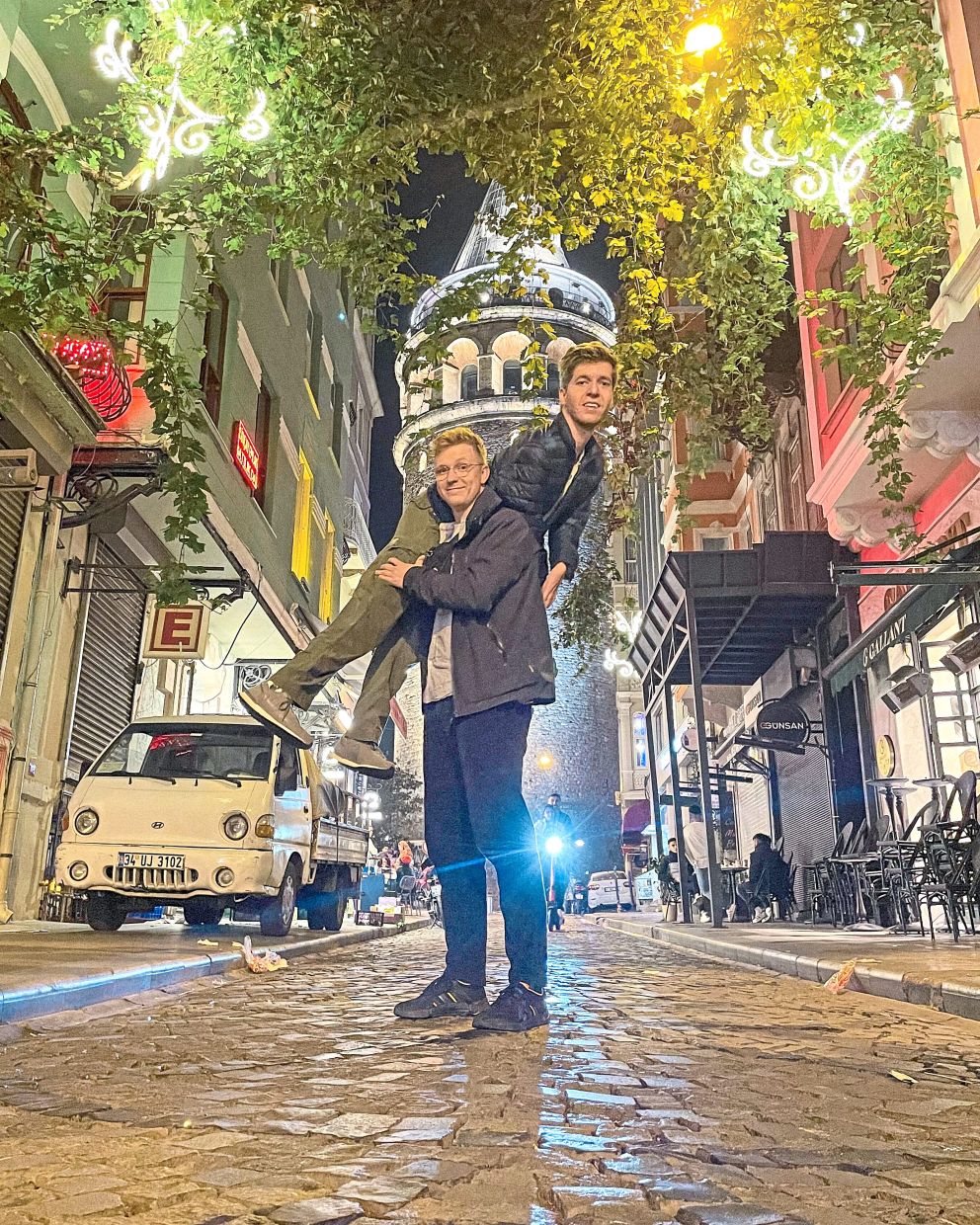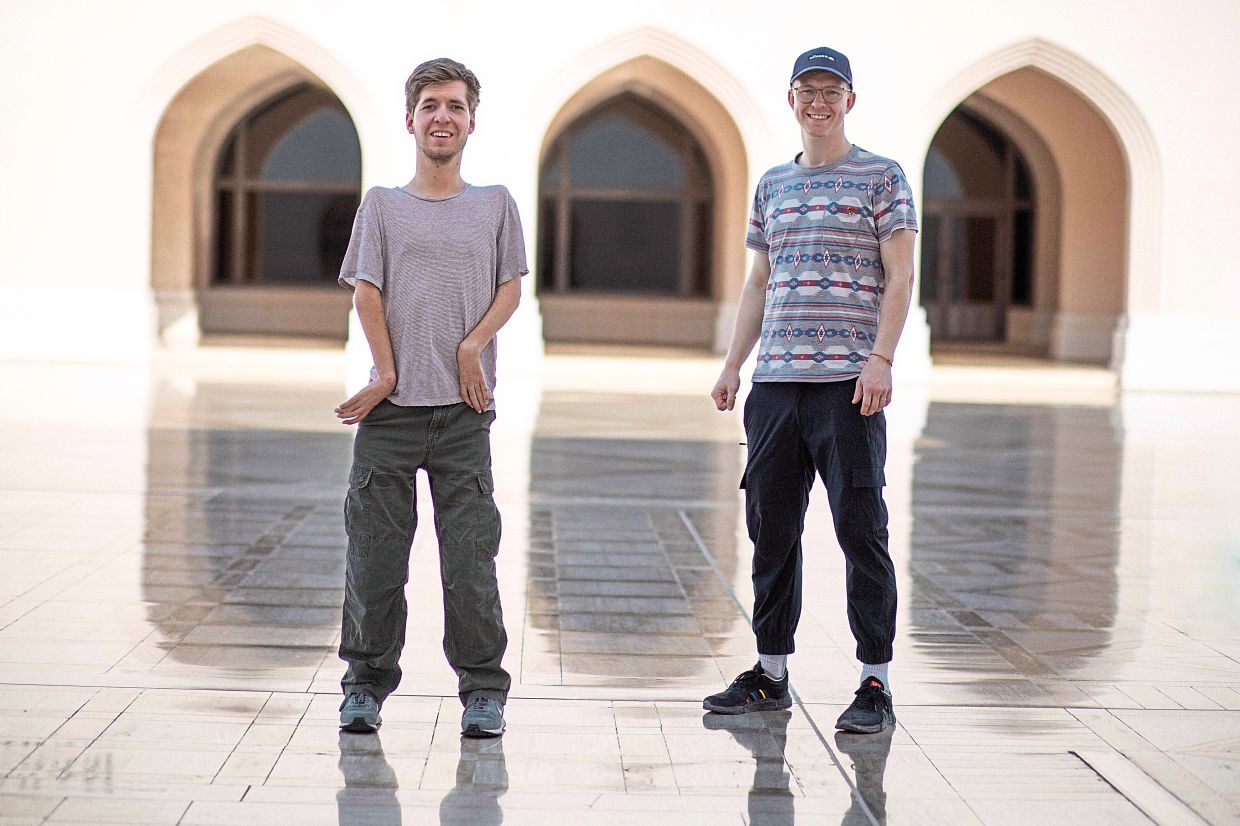Wiefelschutz carrying his friend Kallner on a bridge in Vietnam. — Photos: LOVIS WIEFELSPUTZ/dpa
Many young people dream of going on a so-called gap year after graduating from school or university. Backpacking, exploring, seeing the world – all these adventures are a little more complicated for those who suffer from severe disabilities.
Two young Germans, Alexander Kallner and Lovis Wiefelsputz, decided to face those complications head-on when they began their journey around the world in October 2022.
Kallner, 25, has a severe physical disability; he relies on constant assistance. But this has not stopped the pair from fulfilling their dream to see the world. Together with his 26-year-old travel partner and friend, Kallner has visited countries like Singapore, Malaysia (specifically, Kuala Lumpur and Langkawi in Kedah), Australia, Vietnam, Oman and many more.
Kallner and Wiefelsputz have spent five months together, uninterrupted. The longest they have been apart throughout their adventure was for six hours in Sydney, Australia – a longer separation is not an option for Kallner, who needs help brushing his teeth, getting dressed, eating and doing other basic things.
Wiefelsputz often carries his friend up the stairs, a task which he says he likes doing. “Fortunately, he doesn’t weigh much,” says the young man.
Kallner, who studied in Hamburg, Germany says he first realised that travelling the world might be possible during his semester abroad in Spain. A fellow student had assisted him during his stay there.
“I realised that I wanted to go abroad even more and that something like that (getting assisted by a travel partner) was possible. That hadn’t even crossed my mind before,” says Kallner.
He then asked his best friend whether he thought more ambitious travel plans might be on the cards for him. The pair had already been on holidays together before.
“We thought a lot about how a trip around the world could work,” says Wiefelsputz.
Taking on the hurdles
Kallner has arthrogryposis, or AMC, a rare disease present at birth which causes joint stiffness and muscle weakness. To enable him to walk, Kallner wears orthotics on his legs. “You could say they are steel stockings that give me support when I stand and walk,” he says.
He cannot carry a heavy backpack, his hands can only hold very light things and he has limited use of his arms.
But the friends were determined to try to make their travel plans become reality.
Wiefelsputz was studying media management and journalism in Oldenburg, not far from Hamburg, at the time. He thus had the idea to document the year-long world trip on social media and a blog called “Hurdle The World”.
The aim was to encourage others with disabilities to go travelling, says Wiefelsputz. “Travelling should be possible for everyone,” he stresses.
Both say the trip has opened their eyes to the accessibility of cities around the world.
“The most accessible city is Singapore,” says Wiefelsputz. “We didn’t have to climb a single flight of stairs there.”
The two friends also say they found people in Asia most willing to help. “People sometimes sprinted up to us in the street to help us,” recounts Kallner.
It was a different story in Vietnam, which, according to the two men, still has a long way to go in terms of accessibility.
During their travels, they reached out to organisations supporting those with special needs for help and even spoke with an influencer with special needs in Sydney.
Funding issues
Whether they will keep travelling for a whole year remains up in the air. Just like many other globetrotters, their finances are slowly running out, with their budget currently only lasting until this month. So far, their funds have relied on savings and donations from both their families.
Unfortunately, unlike other young travellers, it is not as easy for Kallner and Wiefelsutz to supplement their travels through part-time jobs. With Kallner requiring round-the-clock assistance, it would not be possible for his friend to start working.
Because of this, the pair has decided to launch a GoFundMe campaign to fundraise their trip.
Their role model for inclusion and accessibility is activist Raul Krauthausen. In a podcast from August 2022, Krauthausen pointed out how expensive travel can be as a wheelchair user who is also dependent on assistance.
Listing expenses, the activist said he has to pay for his assistant’s accommodation and travel costs. Additionally, labour laws require the assistant to receive days off, meaning that Krauthausen would need to travel with several helpers.
This has led to people with special needs to holiday more within their home country, and less often, said Krauthausen.
For Kallner, pay and working hours are not a problem as his assistant is his friend.
But he is worried about putting too much pressure on Wiefelsputz. “The last few months have been quite a challenge for him,” he says.
“The issue of responsibility is a big thing every day. Without me, it’s either not possible or very difficult,” says Wiefelsputz.
Before leaving for South America, they went to Madrid for a few days to catch their breath.
Kallner’s mother came to visit to look after her son, as she usually does at home. This gave Wiefelsputz some time off.
But he says he is also dependent on Kallner, as he suffers from ADHD (attention-deficit/hyperactivity disorder). “We both have our own special impairments,” Wiefelsputz says.
As he has problems with planning their travels and managing itineraries, this task falls to Kallner, who also takes care of all the budgeting.
“So we are a team that works well together,” says Wiefelsputz. – Janet Binder/dpa







